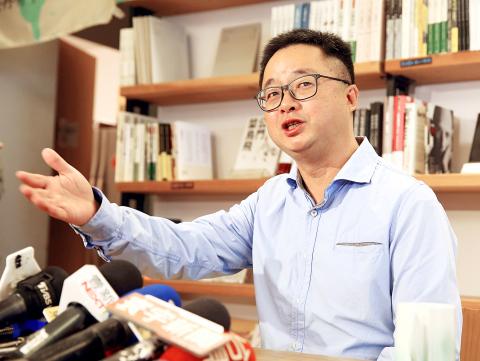Democratic Progressive Party (DPP) secretary-general-designate Luo Wen-chia (羅文嘉) yesterday said he would restore the party’s “brand image” by modernizing its surveys and improving its communication with the public.
Luo made the remarks at Buffalo Books, a Taipei cafe-bookstore he has managed over the past seven years, one day after DPP Chairman Cho Jung-tai (卓榮泰) announced his appointment.
“I have been out of politics for nine years and working at a normal job for seven years, so it is natural for people to ask why I am coming back,” he said.

Photo: CNA
“Frankly, I am not here for the DPP, Cho or President Tsai Ing-wen (蔡英文). This is for my children and parents like myself, who hope that long after today, our children can still breathe freely, speak their minds without fear and enjoy the fruits of Taiwanese democracy and values, which our forebears fought so hard for,” Luo said.
The DPP has lost the public support it enjoyed two years ago and part of the reason must be in the party itself, he said, adding that shifting blame to others would doom the party to more losses.
“I will use scientific and rational analysis, including opinion polls, market analytics and academic research, to discover those reasons and find solutions,” Luo said, adding: “The DPP has a problem with its brand image.”
While the DPP suffers from the effects of its bad image, its main rival, the Chinese Nationalist Party (KMT), has not changed in any meaningful way, resulting in the rise of new political parties and independent politicians free from old labels, he said.
He would identify the problems with the DPP’s image and fix them before “the product goes up for sale next year,” Luo said, referring to next year’s presidential and legislative elections.
“The party headquarters should act as a platform to coordinate responses to issues that could negatively affect the party’s image,” he said.
It would take more than a year to build up the DPP’s image, Luo said, adding that he intends to form a professional infrastructure to improve communication with the public in the information age.
“The biggest problem with our politicians is that they are out of touch with society,” he said.
When asked whether he sees his role as one of building bridges between the DPP leadership and the party’s pro-independence wing, Luo said the party should be building bridges with all sectors of society.
“While many people think of a competition between the pan-blue and pan-green camps, I think of a competition between Taiwan and the authoritarian forces of China,” he added.
“The DPP should build bridges with all people, groups and forces that resist China’s dictatorship,” Luo said.

Alain Robert, known as the "French Spider-Man," praised Alex Honnold as exceptionally well-prepared after the US climber completed a free solo ascent of Taipei 101 yesterday. Robert said Honnold's ascent of the 508m-tall skyscraper in just more than one-and-a-half hours without using safety ropes or equipment was a remarkable achievement. "This is my life," he said in an interview conducted in French, adding that he liked the feeling of being "on the edge of danger." The 63-year-old Frenchman climbed Taipei 101 using ropes in December 2004, taking about four hours to reach the top. On a one-to-10 scale of difficulty, Robert said Taipei 101

Nipah virus infection is to be officially listed as a category 5 notifiable infectious disease in Taiwan in March, while clinical treatment guidelines are being formulated, the Centers for Disease Control (CDC) said yesterday. With Nipah infections being reported in other countries and considering its relatively high fatality rate, the centers on Jan. 16 announced that it would be listed as a notifiable infectious disease to bolster the nation’s systematic early warning system and increase public awareness, the CDC said. Bangladesh reported four fatal cases last year in separate districts, with three linked to raw date palm sap consumption, CDC Epidemic Intelligence

US climber Alex Honnold left Taiwan this morning a day after completing a free-solo ascent of Taipei 101, a feat that drew cheers from onlookers and gained widespread international attention. Honnold yesterday scaled the 101-story skyscraper without a rope or safety harness. The climb — the highest urban free-solo ascent ever attempted — took just more than 90 minutes and was streamed live on Netflix. It was covered by major international news outlets including CNN, the New York Times, the Guardian and the Wall Street Journal. As Honnold prepared to leave Taiwan today, he attracted a crowd when he and his wife, Sanni,

Two Taiwanese prosecutors were questioned by Chinese security personnel at their hotel during a trip to China’s Henan Province this month, the Mainland Affairs Council (MAC) said yesterday. The officers had personal information on the prosecutors, including “when they were assigned to their posts, their work locations and job titles,” MAC Deputy Minister and spokesman Liang Wen-chieh (梁文傑) said. On top of asking about their agencies and positions, the officers also questioned the prosecutors about the Cross-Strait Joint Crime-Fighting and Judicial Mutual Assistance Agreement, a pact that serves as the framework for Taiwan-China cooperation on combating crime and providing judicial assistance, Liang